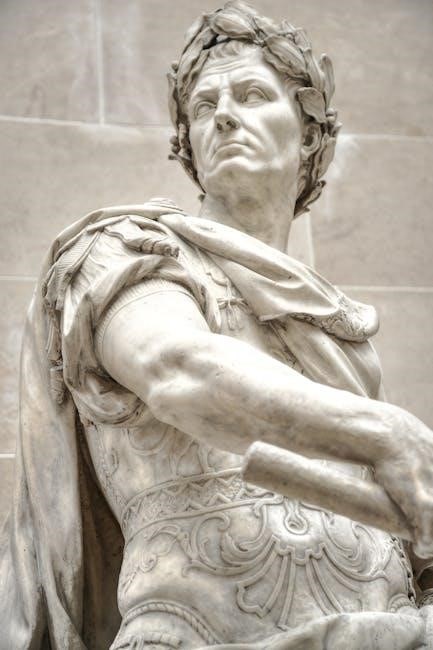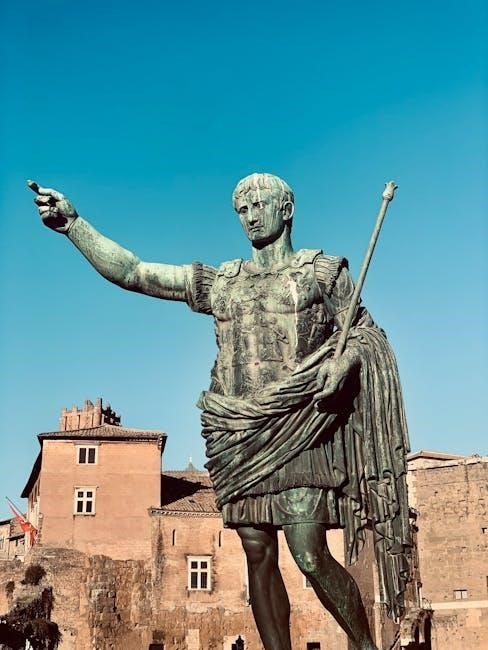William Shakespeare’s Julius Caesar is a timeless tragedy exploring ambition, betrayal, and fate in ancient Rome, chronicling Caesar’s rise, assassination, and its profound aftermath.
Overview of William Shakespeare’s Play
William Shakespeare’s Julius Caesar is a tragic drama that explores themes of ambition, power, and betrayal. Set in ancient Rome, the play centers on Julius Caesar’s rise to dictatorship and his subsequent assassination by a group of conspirators led by Brutus and Cassius. The drama delves into the political turmoil and moral dilemmas faced by the characters, particularly Brutus, who grapples with the justification of his actions. Mark Antony’s powerful oration and the ensuing civil war highlight the consequences of Caesar’s death. The play examines the clash between republicanism and imperialism, offering a profound commentary on human nature and leadership.
Historical Context of Julius Caesar
The play is set in 44 B.C., a time of political upheaval in Rome. Julius Caesar’s rise to power threatened the Roman Republic, as he sought to transition from a republican system to an imperial one. The First Triumvirate, formed with Pompey and Crassus, solidified his influence, but his dominance sparked fear among the Senate. Caesar’s dictatorship and crossing the Rubicon River marked the end of the Republic. His assassination on the Ides of March was a desperate attempt to restore republican values, but it instead led to civil war and the rise of the Roman Empire under Augustus.
Significance of the Play in Literature
William Shakespeare’s Julius Caesar holds immense significance in literature as a masterful exploration of ambition, power, and human nature. Its timeless themes resonate across centuries, making it a cornerstone of dramatic literature. The play’s nuanced portrayal of political intrigue and moral dilemmas continues to influence modern adaptations and interpretations. It remains a fundamental text in studying Shakespeare’s craft, offering insights into leadership, loyalty, and the consequences of unchecked ambition. Its enduring relevance ensures its place as a vital work in literary and theatrical studies, shaping discussions on ethics and governance.

Plot Summary
Julius Caesar explores Caesar’s rise, conspiracy against him, and his assassination, followed by power struggles among Brutus, Cassius, Antony, and Octavius, shaping Rome’s fate.
Act I: Caesar’s Triumph and the Conspiracy Begins
The play opens with Julius Caesar’s triumphant return to Rome after a victorious campaign. The people celebrate, but senators, fearing his growing power, plot against him. A soothsayer warns Caesar, “Beware the Ides of March,” but Caesar dismisses the warning. Meanwhile, Brutus and Cassius, concerned about Caesar’s rising authority, begin forming a conspiracy. They recruit other senators, exploiting their fears of tyranny. Caesar’s wife, Calpurnia, shares a troubling dream, urging him to stay home, but he refuses, believing in his own invincibility. The stage is set for a tragic confrontation.
Act II: The Assassination of Julius Caesar
Act II centers on the conspiracy unfolding as Brutus and Cassius lead the senators against Caesar. Despite Calpurnia’s ominous dreams and a soothsayer’s warning, Caesar attends the Senate. The conspirators surround him, and Brutus delivers the final blow. Caesar’s last words, “Et tu, Brute?” reflect his shock and betrayal. The assassination sparks chaos, and the conspirators justify their actions as a sacrifice for Rome’s freedom. Caesar’s death marks the turning point, setting the stage for power struggles and retribution. The act highlights the tragic consequences of ambition and betrayal.
Act III: The Aftermath and Antony’s Rise
Act III explores the chaotic aftermath of Caesar’s assassination. Mark Antony delivers a powerful funeral oration, manipulating public sentiment against Brutus and Cassius. His rhetoric ignites rebellion, turning Rome against the conspirators. Meanwhile, Antony forms alliances to avenge Caesar’s death. The act highlights Antony’s strategic brilliance and emotional appeal, showcasing his rise as a dominant political force. Tensions escalate as the conspirators face growing opposition, setting the stage for further conflict. This act underscores the unpredictable nature of power and the consequences of unchecked ambition.
Act IV: Civil War and the Battle of Philippi
Act IV depicts the escalating civil war as Brutus and Cassius flee Rome, pursued by Antony and Octavian. The conspirators, struggling with internal conflicts, face defeat at the Battle of Philippi. Cassius, believing all is lost, takes his own life, followed by Brutus. Their deaths mark the end of the Republic and the rise of the Empire. Antony and Octavian’s victory solidifies their power, while Brutus’s tragic end symbolizes the collapse of noble ideals. The act highlights the devastating consequences of ambition and betrayal, leading to irreversible political change in Rome.
Act V: The Tragic Conclusion
Act V brings the play to its tragic climax. Following their defeat at Philippi, Brutus and Cassius confront their inevitable demise. Brutus, realizing the futility of their cause, takes his own life on the battlefield. Cassius, believing Brutus is dead, also commits suicide. Antony, in a moment of respect, acknowledges Brutus’s noble intentions, distinguishing him from the other conspirators. The act concludes with Antony and Octavian’s triumph, marking the end of the Republic and the rise of the Empire. The tragic conclusion underscores the devastating cost of ambition, loyalty, and the fall of noble ideals.

Key Characters
Julius Caesar, the tragic hero, embodies ambition. Brutus, the idealist, leads the conspiracy. Cassius, cunning, manipulates Brutus. Mark Antony, loyal, rises politically.
Julius Caesar: The Tragic Hero
Julius Caesar, as a tragic hero, exemplifies the complexities of power and ambition. His triumphs and flaws drive the narrative, showcasing his rise to dominance and eventual downfall. Caesar’s charisma and strategic brilliance solidify his position, but his perceived arrogance and disregard for republican values create enemies. The soothsayer’s prophecy, “Beware the Ides of March,” underscores the inevitability of his fate. His assassination, orchestrated by senators fearing his dictatorship, highlights the tragic consequences of his unyielding ambition. Caesar’s legacy endures, blending admiration for his achievements with sorrow for his tragic end, cementing his place as a Shakespearean tragic hero.
Brutus: The Idealist and Conspirator
Brutus, a central figure in Shakespeare’s Julius Caesar, embodies the conflict between idealism and political reality. Driven by his belief in the Roman Republic and fear of Caesar’s growing power, Brutus becomes the moral leader of the conspiracy. His internal struggles, notably in the soliloquy of Act II, reveal a man torn between loyalty to Caesar and duty to Rome. Despite his noble intentions, Brutus’s rigid idealism leads to tragic consequences, as his actions spark civil war and ultimately result in his own downfall. His story highlights the tension between honor and practicality in political decision-making.
Cassius: The Mastermind of the Conspiracy
Cassius, a skilled and ambitious Roman senator, serves as the mastermind behind the conspiracy against Julius Caesar. Driven by envy of Caesar’s power and fear of his potential dictatorship, Cassius cleverly manipulates others, including Brutus, to join the plot. His sharp intellect and strategic thinking make him the driving force of the conspiracy. Cassius’s motivations, however, are not entirely altruistic, as he seeks to eliminate Caesar to advance his own political standing. Despite his cunning, Cassius’s inability to grasp the deeper emotions of others, like Brutus’s internal conflict, ultimately contributes to the conspirators’ downfall.
Mark Antony: The Loyalist and Politician
Mark Antony, a loyal supporter of Julius Caesar, emerges as a shrewd politician and skilled orator. After Caesar’s assassination, Antony delivers a powerful speech at his funeral, using rhetoric to turn public opinion against the conspirators; His emotional appeal and strategic manipulation of Caesar’s legacy showcase his political brilliance. Antony’s alliance with Octavian ultimately leads to the downfall of Brutus and Cassius. His loyalty to Caesar and ability to navigate the political chaos highlight his transformation from a loyalist to a key figure in shaping Rome’s future.

Themes and Motifs
Ambition, power, loyalty, betrayal, fate, and republic vs. empire are central themes, exploring human nature and political strife through Caesar’s rise and fall.
Ambition and Power
In Julius Caesar, ambition and power are central themes, driving the characters’ actions and shaping the fate of Rome. Caesar’s rise to dictatorship, fueled by his unrelenting ambition, sparks fear among the senators, who view his power as a threat to the republic. Brutus, too, is consumed by ambition, believing his actions are justified to restore Roman honor and liberty. The play explores how ambition can lead to both greatness and destruction, highlighting the moral complexities of pursuing power and the devastating consequences of its abuse.
Loyalty and Betrayal
Loyalty and betrayal are pivotal themes in Julius Caesar, shaping the characters’ decisions and the play’s tragic outcome. Caesar’s loyalists, like Mark Antony, remain steadfast in their devotion, while Brutus and Cassius justify their betrayal as a noble act to save Rome. The tension between loyalty to a leader and loyalty to a cause underscores the moral conflict, particularly for Brutus, who struggles with his friendship with Caesar and his commitment to the republic. The play highlights how betrayal, even with noble intentions, leads to devastating consequences and reshapes the political landscape of Rome.
Fate and Prophecy
Fate and prophecy play a central role in Julius Caesar, as characters are influenced by omens and predictions that shape their destinies. The soothsayer’s warning to Caesar, “Beware the Ides of March,” serves as a recurring motif, emphasizing the inevitability of fate. Calpurnia’s prophetic dreams further heighten the tension, illustrating how even the most powerful are subject to forces beyond their control. The interplay of fate and free will creates tragic irony, as characters like Caesar and Brutus are drawn toward outcomes they cannot escape, ultimately fulfilling the prophecies that seal their fates.
Republic vs. Empire
In Julius Caesar, Shakespeare explores the tension between the Roman Republic and the rise of the Empire. Caesar’s growing power threatens the Republic, prompting the conspirators to act in its defense. The play highlights the political and philosophical clash between the ideals of Republican liberty and the centralized authority of an Empire. Caesar’s assassination aims to preserve the Republic, but ultimately, his death accelerates the transition to imperial rule under his adopted son, Octavian; This shift underscores the end of an era and the birth of a new political order in Rome.

Historical Context
Shakespeare’s Julius Caesar is set in 44 BCE Rome, exploring political turmoil during Caesar’s rise and assassination. The play reflects the Republic’s transition to Empire.
Rome in 44 B.C.
Rome in 44 B.C. was a city on the brink of political upheaval. The Roman Republic, nearing its end, faced intense power struggles. Julius Caesar, having expanded Rome’s territories and centralized authority, had become a dominant force, sparking fears of monarchy among senators. The city’s economy thrived from conquests, but wealth disparities grew. Public works projects, like Caesar’s renovations, aimed to stabilize society. However, the elite and common people remained divided. This volatile environment set the stage for Caesar’s assassination, plunging Rome into chaos and marking the Republic’s decline.
The Role of the Senate
In 44 B.C., the Roman Senate played a pivotal role in governance, serving as the ruling class’s advisory body. Composed of aristocrats and former magistrates, it aimed to maintain republican traditions. However, its power waned as Julius Caesar’s dominance grew. Senators feared his rise would dismantle their influence, leading to tensions. While some sought to preserve the Republic, others pursued personal agendas. The Senate’s structure, including consuls and magistrates, was designed to balance power, but internal divisions weakened its authority. This instability contributed to Caesar’s assassination, as senators sought to reclaim control, ultimately accelerating the Republic’s collapse.
The Real Julius Caesar: A Historical Perspective
Julius Caesar was a Roman general and statesman who transformed the Roman Republic. Born in 100 B.C., he rose to power through military conquests and political alliances. His victories in Gaul expanded Rome’s territories, and his dictatorship laid the groundwork for the Roman Empire. Caesar’s reforms, such as the Julian calendar, had lasting impacts. However, his centralized power and perceived monarchy led to his assassination in 44 B.C. by senators fearing tyranny. Historically, Caesar remains a complex figure, celebrated for his achievements but criticized for undermining republican ideals. His legacy shaped Rome’s transition from republic to empire.

Analysis and Commentary
Shakespeare’s portrayal of Julius Caesar explores themes of ambition, power, and human nature, offering timeless insights into political intrigue and the consequences of unchecked authority.
The Play’s Structure and Dramatic Impact
Shakespeare’s Julius Caesar is structured into five acts, each advancing the plot with escalating tension. Act I introduces Caesar’s triumph and the budding conspiracy, while Act II culminates in his assassination. Acts III–V depict the fallout, political power struggles, and eventual downfall of the conspirators. This dramatic progression emphasizes the consequences of ambition and betrayal. The play’s compact structure enhances its tragic impact, with soliloquies and dialogues revealing deeper motivations. Shakespeare’s use of dramatic irony and foreshadowing intensifies the emotional resonance, making the play a masterclass in storytelling and character development. Its tightly woven narrative ensures enduring theatrical relevance.
Language and Rhetoric in Julius Caesar
Shakespeare’s Julius Caesar showcases masterful language and rhetoric, with characters employing persuasive speech to manipulate emotions and opinions. Brutus and Antony deliver iconic funeral orations, contrasting in style but equally powerful. Antony’s emotional appeal, beginning with “Friends, Romans, countrymen,” outshines Brutus’s logical reasoning, highlighting the impact of rhetoric on public sentiment. Caesar’s own language reflects his authority, while Cassius uses subtle persuasion to sway Brutus. The play’s dialogue is rich with metaphor, alliteration, and dramatic irony, emphasizing themes of power and deception. Shakespeare’s linguistic brilliance underscores the tragedy’s depth and enduring relevance.
The Consequences of Caesar’s Assassination
The assassination of Julius Caesar led to profound political upheaval in Rome; His death created a power vacuum, sparking a brutal civil war between Caesar’s loyalists, led by Mark Antony and Octavian, and the conspirators. The conflict ultimately destroyed the Roman Republic, paving the way for the rise of the Roman Empire under Caesar’s adopted son, Octavian. The play vividly portrays how Caesar’s murder unraveled the fragile stability of Rome, highlighting the destructive nature of ambition and betrayal. The consequences of his death reshaped Rome’s destiny, leaving a legacy of tragedy and transformation.

Character Dynamics
The play explores complex relationships, focusing on friendships, rivalries, and betrayals among Caesar, Brutus, Cassius, and Antony, revealing their motivations and emotional conflicts.
Caesar and Brutus: A Tale of Friendship and Betrayal
The relationship between Julius Caesar and Brutus is a central theme, highlighting a deep friendship turned tragic by betrayal. Caesar, who trusts Brutus immensely, sees him as a loyal ally, while Brutus struggles with internal conflict. Despite their bond, Brutus joins the conspiracy, believing Caesar’s death will save Rome from tyranny. His decision, driven by idealism and a misguided sense of honor, ultimately leads to Caesar’s tragic demise. The famous line, “Et tu, Brute?” captures Caesar’s shock and sorrow at Brutus’s betrayal, underscoring the complexity of their friendship and its devastating end.
Cassius and Brutus: The Complexity of the Conspiracy
The partnership between Cassius and Brutus forms the backbone of the conspiracy against Julius Caesar. Cassius, a cunning strategist, manipulates Brutus’s noble ideals to gain his support. While Cassius acts out of personal resentment and ambition, Brutus believes the assassination will restore Roman honor. Their contrasting motivations create tension but also strengthen the conspiracy’s legitimacy. Cassius’s pragmatic nature balances Brutus’s idealism, making them a formidable team. However, their differing goals ultimately lead to miscalculations, as Cassius’s ruthlessness clashes with Brutus’s ethical constraints, unraveling their alliance and sealing their fate.
Antony and Caesar: Loyalty and Legacy
Mark Antony’s unwavering loyalty to Julius Caesar is a central theme, as he evolves from a devoted friend to a cunning politician. Antony’s famous eulogy manipulates public opinion, turning the tide against the conspirators. His loyalty becomes a tool for vengeance, showcasing his deep emotional bond with Caesar. Their relationship highlights the interplay between personal allegiance and political ambition. Antony’s actions after Caesar’s death not only honor his legacy but also pave the way for his own rise to power, illustrating how loyalty can shape destiny and reshape Rome’s political landscape.

Moral and Ethical Dilemmas
The play explores complex moral choices, such as justifying assassination for the greater good and the struggle between honor and ambition, highlighting ethical conflicts.
Justifying Assassination
In Julius Caesar, Brutus and Cassius justify Caesar’s assassination as a necessary act to preserve Rome’s republic and prevent tyranny. They argue that Caesar’s rising power threatens liberty, making his death a noble sacrifice for the greater good. However, their reasoning is deeply conflicted, as personal ambition and fear also motivate their actions.
The play challenges the morality of political violence, questioning whether killing can ever be justified, even for noble ideals. Shakespeare portrays the conspirators’ moral struggle, highlighting the ethical ambiguity of their decision and its tragic consequences for Rome.
The Clash Between Honor and Ambition
In Julius Caesar, the clash between honor and ambition is a central theme, driving the characters’ actions and decisions. Caesar’s ambition for power conflicts with Brutus’s sense of honor and loyalty to Rome. Brutus, believing in the greater good, sacrifices his personal relationship with Caesar for what he sees as the preservation of liberty. Similarly, Cassius, fueled by jealousy and ambition, manipulates Brutus into joining the conspiracy. The play explores how ambition can corrupt even noble intentions, leading to tragedy and chaos. This struggle between personal ambition and moral honor defines the characters’ fates and the play’s outcome.
The Tragedy of Noble Intentions
The tragedy of noble intentions in Julius Caesar lies in the devastating consequences of well-meaning actions. Brutus and Cassius, believing their cause just, assassinate Caesar to preserve Rome’s republic. However, their noble intentions are overshadowed by the chaos that follows. Their actions, rooted in honor and a desire to protect Rome, ultimately lead to civil war, personal destruction, and the rise of a stronger dictatorship under Antony and Octavian. The play highlights how even noble motives can result in tragic outcomes, underscoring the complexity of human ideals and their collision with reality.

Study Guide and Resources
Access detailed PDF summaries and analyses for Julius Caesar, offering insights into themes, characters, and historical context.
Explore key questions for deeper understanding of the play’s structure and significance.
Find recommended critical essays and commentaries for advanced study and interpretation.
PDF Summaries and Analysis

Download comprehensive PDF summaries and analyses of Julius Caesar to deepen your understanding of the play. These resources provide detailed breakdowns of themes, characters, and key events, offering a clear overview of Shakespeare’s exploration of ambition, loyalty, and power. PDF guides often include scene-by-scene analysis, character motivations, and historical context, making them invaluable for students and scholars. They also highlight the play’s dramatic structure and its enduring relevance in literature. Use these summaries to grasp complex plot points and prepare for essays or exams with confidence.
- Detailed breakdowns of themes and motifs.
- In-depth analysis of character motivations.
- Key scenes and their significance.
- Historical context and literary impact.
- Study aids for academic success.
Key Questions for Understanding the Play
Exploring Julius Caesar requires addressing essential questions about its themes, characters, and historical context. What motivates Brutus and Cassius to conspire against Caesar? How does Caesar’s ambition impact Rome’s political landscape? What role does fate versus free will play in shaping the characters’ destinies? How does Antony manipulate public opinion after Caesar’s death? What lessons does the play offer about power, loyalty, and betrayal? Analyzing these questions deepens your comprehension of Shakespeare’s exploration of human nature and political intrigue, making the play’s themes timeless and universally relevant.
- What drives Brutus’s decision to join the conspiracy?
- How does Caesar’s death reshape Rome’s political structure?
- What role does rhetoric play in shaping outcomes?
- What lessons does the play teach about ambition and leadership?
Recommended Critical Essays and Commentaries
Scholarly essays on Julius Caesar provide deep insights into its themes, character dynamics, and historical relevance. Northrop Frye’s analysis of tragedy and power structures offers a compelling perspective on Caesar’s rise and fall. Janet Adelman’s feminist critique explores the play’s portrayal of masculinity and political ambition. Additionally, essays by Harold Bloom and Stephen Greenblatt delve into the complexities of rhetoric, morality, and leadership. These commentaries enrich understanding of Shakespeare’s exploration of human nature and political intrigue, making them essential reads for scholars and enthusiasts alike.
- Northrop Frye’s “Tragic Heroism in Shakespeare”
- Janet Adelman’s “The Common Liar”
- Harold Bloom’s “Shakespeare: The Invention of the Human”
- Stephen Greenblatt’s “Shakespearean Negotiations”

